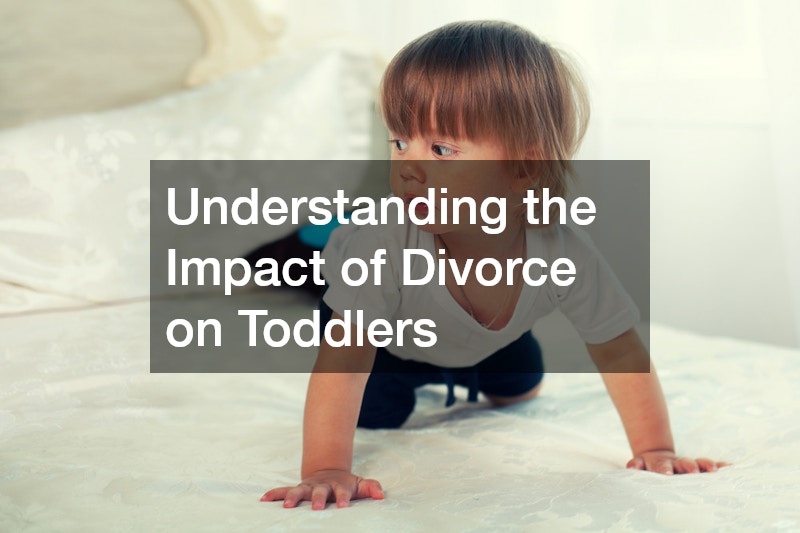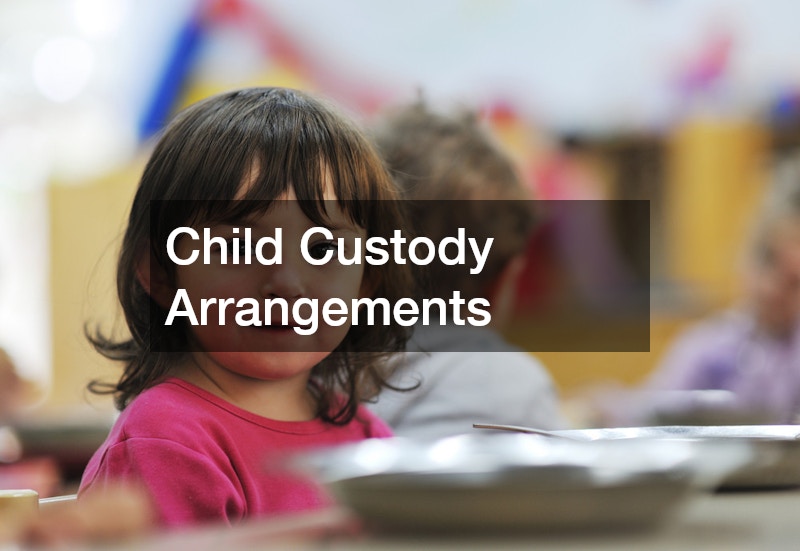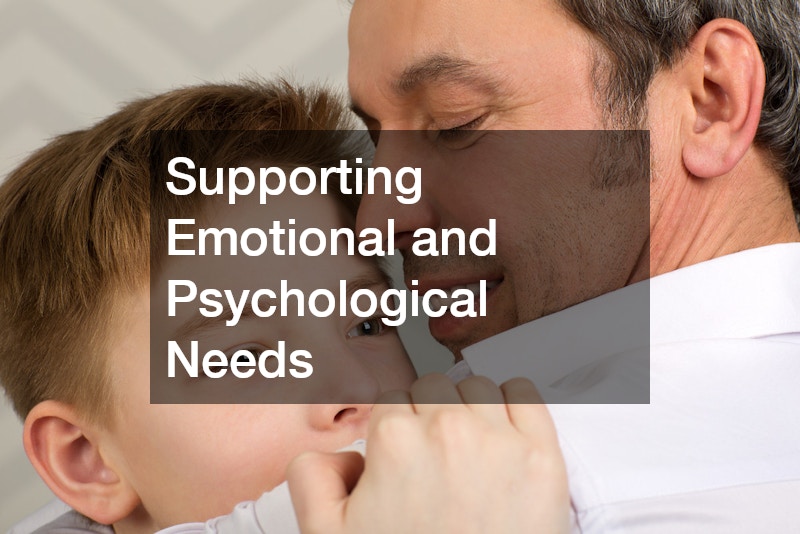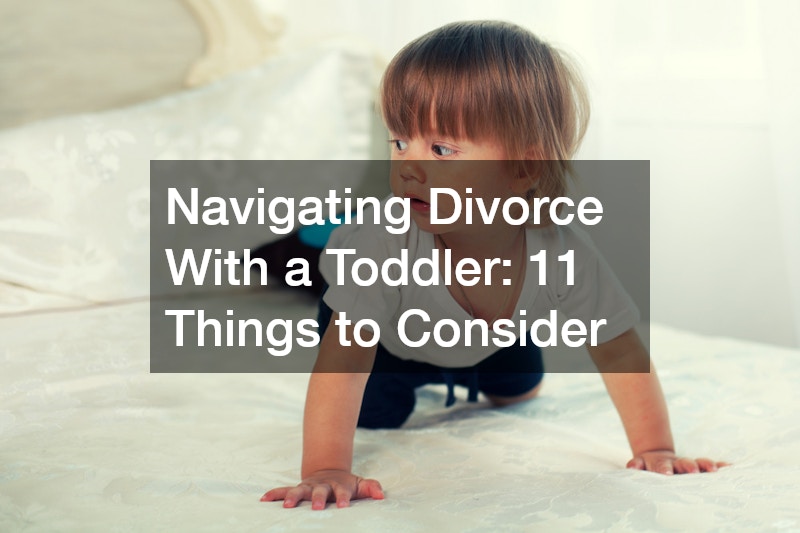Divorce can be a challenging journey for anyone, but when you add a toddler into the mix, complexities can increase significantly. The emotional upheaval, logistical challenges, and legalities are complicated further when young children are involved. Parents must navigate this tumultuous time with care, as their child’s well-being is paramount. This article provides essential considerations for navigating divorce with a toddler, emphasizing the importance of focused decision-making and support systems in this difficult time.

- 1. Understanding the Impact of Divorce on Toddlers
- 2. Legal Considerations and Seeking Professional Help
- 3. Child Custody Arrangements
- 4. Communication is Key
- 5. Supporting Emotional and Psychological Needs
- 6. Co-Parenting Strategies
- 7. The Role of Divorce Mediation
- 8. Finances and Child Support
- 9. The Importance of Stable Routines
- 10. Preparing for Future Challenges
- 11. Managing Behavioral Changes and ADHD Treatment
1. Understanding the Impact of Divorce on Toddlers
Toddlers may not fully comprehend the concept of divorce, but they are acutely aware of changes in their environment. These changes can lead to feelings of confusion, fear, and insecurity, which can manifest in behavioral issues or developmental delays. Understanding your toddler’s emotional landscape is crucial in ensuring they feel supported throughout the divorce process.
Research indicates that children this age may exhibit signs of distress through increased clinginess, sleep disturbances, or regression in developmental milestones. It is essential to recognize these behaviors not as a mere phase but as a call for reassurance and stability. Consulting with pediatricians or child psychologists can provide valuable insights into how your child may cope during the transition.
Providing a nurturing environment where your child feels safe to express their emotions is critical. Open dialogue about their feelings, even if they cannot articulate them fully, can help facilitate this process. As parents navigate divorce with a toddler, prioritizing emotional security can help mitigate many of the potential negative effects.
2. Legal Considerations and Seeking Professional Help
When facing divorce with a toddler, the legal aspects require careful consideration. Engaging a knowledgeable child custody lawyer can help you understand your rights and responsibilities as a parent during this time. These legal professionals specialize in navigating custody arrangements and can provide guidance tailored to your family’s needs.
A family attorney at law can assist in various aspects of the divorce process, including mediation, custody planning, and support agreements. Their expertise helps in creating a framework that addresses the needs of your child, promoting their best interests while acknowledging both parents’ roles. Depending on the circumstances, a divorce lawyer can also facilitate negotiations surrounding child support and visitation, making it vital to secure legal representation early on.
Choosing a reputable family law firm can provide a comprehensive support system during a tumultuous time. These firms often have resources, such as child support attorneys, on site who specialize in financial agreements concerning your child’s care. By involving skilled professionals, you can ensure that the legal proceedings proceed as smoothly as possible, allowing you to focus on your child’s needs.

3. Child Custody Arrangements
Custody arrangements can significantly influence your child’s life following a divorce with a toddler. Understanding the different types of custody – physical, legal, joint, or sole – is essential to determining what arrangement will work best for your family. Engaging with a child custody lawyer early can help clarify these terms and advocate for your child’s best interests.
When crafting a custody agreement, aim to establish a framework that promotes stability and consistency for your toddler. This may include establishing regular visitation schedules, co-parenting strategies, and communication channels to ensure that both parents are on the same page. Being flexible and open to adjustments can greatly benefit your child’s emotional well-being.
Finally, bringing a sense of routine to your child’s life during and after the divorce can provide them with a greater sense of security. Incorporating familiar activities, ensuring continued attendance at their Montessori school, or maintaining regular family traditions can all help normalize their experience. By prioritizing your child’s need for stability amidst the upheaval, parents can lay a strong foundation for co-parenting success after divorce with a toddler.
4. Communication is Key
Effective communication is crucial during a divorce, particularly when you have a toddler. Keeping lines of communication open with your co-parent fosters a collaborative environment, enabling both of you to make decisions rooted in your child’s best interests. It is essential to approach discussions respectfully and with a focus on co-parenting.
Using a calm and consistent tone when discussing changes with your toddler is also important. Reassuring them about the love and support they will continue to receive from both parents helps to mitigate feelings of abandonment or insecurity. Utilize simple language and age-appropriate explanations to help them understand their circumstances without overwhelming them.
Moreover, discussing expectations and plans for the future openly will alleviate stress for both you and your child. Establishing ground rules about communication methods can also help prevent misunderstandings, ensuring both parents are informed and involved in their toddler’s upbringing. This level of communication not only uplifts the child’s emotional health but enhances the effectiveness of co-parenting as well.

5. Supporting Emotional and Psychological Needs
Divorce can trigger a wide array of emotions for toddlers. Parents should prioritize fostering emotional intelligence by recognizing and validating their child’s feelings. Simple phrases like “I understand you are upset” can go a long way in helping your toddler feel heard, and it opens the door for expressing additional feelings.
Consulting a pediatrician or child psychologist for guidance may also be beneficial. They can help assess your child’s emotional health and provide strategies for managing any emotional or behavioral issues that may arise. In some cases, age-appropriate therapy or counseling can be effective tools for helping toddlers process their emotions and adjust to their new family dynamics.
In times of upheaval, maintaining a strong support network is vital. Involving family members, trusted friends, or parenting groups can provide outlets of love and stability for your child. By nurturing their emotional needs and creating a supportive environment during divorce with a toddler, parents can enhance their overall well-being and resilience.
6. Co-Parenting Strategies
Co-parenting after a divorce with a toddler comes with its own unique challenges and rewards. Establishing a cooperative and respectful relationship with your co-parent lays the groundwork for effective co-parenting. This requires both parties to prioritize their child’s needs above any personal emotions or conflicts.
Having a shared parenting plan can help create a sense of stability and predictability for your toddler. A clear agreement regarding visitation schedules, holidays, and activities ensures that both parents are involved and aware of their child’s routines. This mutual understanding helps to minimize confusion and uncertainty, which can often be distressing for young children.
Furthermore, keeping an open dialogue about changes in parenting strategies as circumstances evolve is crucial. Being adaptable will allow both parents to accommodate any new emotional or developmental needs that arise. Overall, the success of co-parenting can significantly impact your toddler’s adjustment during and post-divorce.

7. The Role of Divorce Mediation
Divorce mediation can serve as an alternative method to resolve disputes while maintaining focus on shared goals, particularly regarding your toddler. Engaging with a mediator can foster productive communication, allowing both parents to express their needs and concerns. This process can be less adversarial than traditional litigation and can yield faster results that are in the best interest of the child.
Professional mediators often specialize in child welfare, bringing valuable insights that may facilitate a more amicable agreement. They can propose creative solutions to complex issues surrounding custody arrangements, visitation rights, and parenting plans. This collaborative effort can reduce stress and foster a sense of partnership between parents as they navigate the challenges of divorce with a toddler.
By maintaining a focus on problem-solving and cooperation through mediation, both parents can work together to ensure their toddler feels secure and loved. Moreover, reaching agreements that prioritize the child’s well-being can ultimately create a more stable environment, increasing the chances of positive outcomes for all involved. Mediation not only serves immediate needs but helps cultivate a respectful long-term co-parenting relationship.
8. Finances and Child Support
Financial concerns can add substantial stress during a divorce, especially when a toddler is involved. Understanding your financial responsibilities post-divorce, including child support obligations, is essential for ensuring the wellbeing of your child. Engaging a child support attorney can assist in navigating the complexities of support calculations and establishing a fair arrangement that considers both parents’ financial capabilities.
It’s essential to create a budget that accommodates your child’s needs fully, ensuring that they have access to necessary resources such as educational opportunities and healthcare. Ensuring payments are made on time allows for uninterrupted access to childcare necessities and developmental milestones. Having clear agreements in place can ease any tension regarding financial responsibilities, creating a smoother co-parenting experience.
Additionally, understanding the options available for financial support, such as government assistance or community resources, can be beneficial for parents facing a challenging financial situation. Many programs specifically support individuals navigating divorce with young children, emphasizing the community’s role in supporting families in need. A financial consultant or family attorney at law can also provide further insights tailored to your personal situation.
9. The Importance of Stable Routines
Stable routines play a significant role in helping toddlers cope during a divorce. Maintaining consistent daily activities can provide a sense of security and predictability amid changes. By keeping bedtime, mealtime, and playtime routines steady, parents can help minimize anxiety and enhance emotional stability for their child.
Incorporating familiar activities into your toddler’s life, such as attending the same Montessori school or engaging in regular playdates, greatly assists in maintaining continuity. Involving both parents in these routines, where viable, will also reinforce your child’s sense of normalcy and support. Consistent actions can help ease the adjustment period, allowing your toddler to thrive in an ever-changing environment.
Encouraging healthy habits, such as regular physical activity, nutritious meals, and adequate sleep can also have a positive impact on your toddler’s emotional health during this transition. Stability in these areas supports not just their physical well-being but also their emotional resilience, enabling them to face the challenges of divorce with greater strength. By prioritizing routine, parents create a safe haven for their toddler to grow and adapt.
10. Preparing for Future Challenges
Divorce with a toddler often presents ongoing challenges that can extend far beyond initial arrangements. As your child grows, their needs and circumstances will continue to evolve, requiring parents to adapt their co-parenting strategies. This might involve consulting with a guardianship attorney if new family needs arise, ensuring that your child’s best interests remain the priority.
Regular check-ins regarding how the custody arrangement is working can help both parents anticipate and respond to future challenges. It also indicates to your toddler that parents are unified in their commitment to their well-being. Encouraging a collaborative approach can minimize conflicts as your child matures, paving the way for successful navigation of future transitions.
Engaging with professionals who specialize in family law and child development can help parents stay informed about best practices in parenting post-divorce. These insights can aid in ensuring that both parents remain equipped to address changes and challenges as they arise. By being proactive in seeking out support, parents can enhance their child’s positive experiences through continued growth and development.
11. Managing Behavioral Changes and ADHD Treatment
Divorce can bring significant behavioral changes in toddlers, especially as they attempt to process the new family dynamic. Some children may exhibit increased tantrums, difficulty sleeping, or challenges in focusing on routine tasks. These shifts in behavior can sometimes mirror symptoms of attention-related disorders, making it essential for parents to differentiate between temporary emotional responses and underlying conditions such as ADHD. If a toddler’s struggles with concentration, hyperactivity, or impulsivity persist beyond the initial adjustment period, consulting a pediatric specialist for an evaluation may be beneficial.
Understanding the signs of ADHD during early childhood can help parents determine the best course of action for supporting their child’s needs. While divorce-related stress can cause short-term behavioral disruptions, long-term difficulties with focus and impulse control may require targeted ADHD treatment. Pediatricians, child psychologists, and developmental specialists can offer guidance on whether behavioral interventions, structured routines, or, in some cases, medical treatment may be appropriate. Early identification and intervention can significantly improve a child’s ability to adapt to changes and maintain emotional stability.
For toddlers displaying signs of ADHD or heightened emotional distress, creating a structured and predictable environment is crucial. Establishing consistent schedules, reducing distractions, and incorporating calming techniques—such as sensory play or mindfulness activities—can help toddlers feel secure. Additionally, working closely with caregivers, teachers, and medical professionals ensures that children receive the necessary support for both their emotional well-being and cognitive development. By addressing behavioral concerns early and considering appropriate ADHD treatment if needed, parents can create a nurturing space where their toddler thrives despite the challenges of divorce.
Navigating divorce with a toddler requires immense thoughtfulness and care. The journey ahead can pose significant challenges; however, prioritizing your child’s well-being will be the utmost important goal throughout this process. Though the road ahead may be arduous, it is essential to remember that these efforts will serve to benefit not only your child’s future but your relationship as co-parents. Together, creating a nurturing environment amidst the upheaval will lay the foundation for a brighter tomorrow for you and your toddler.





